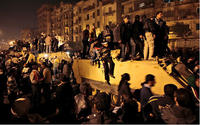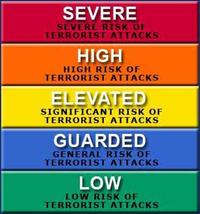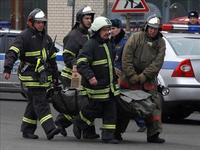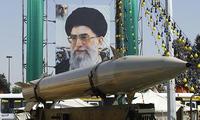-
New Jersey's detention center expansion underway
With the growing number of deportations of illegal aliens from the United States, federal officials expect demand for space to rise within coming years; Newark county officials are awaiting approval by federal authorities to upgrade and expand the Essex County Correctional Facility, significantly increasing its detainee capacity. The county’s proposal would provide a less punitive setting for detainees along with improved medical care, amenities, and federal oversight
-
-
U.S., Egypt look to post-Mubarak era

The days of Hosni Mubarak in office appear numbered, and there are behind-the-scenes discussions among U.S., Egyptian, and Saudi diplomats about a “smooth transition”; it is not yet clear whether the efforts to ease Mubarak out are meant to allow the military regime which came to power in 1952 to remain in power, headed by more acceptable leaders than Mubarak, or whether these efforts are aimed at a more thorough revamping of the Egyptian political system; the main goal is to prevent a repetition of the Iran 1979 scenario: an authoritarian regime replaced by a centrist, secular — but weak and devoid of support — government, only for that government to be swept from power by the Ayatollahs within months
-
-
Iranian suicide-bombing book found in Arizona desert
A book celebrating suicide bombers has been found in the Arizona desert just north of the U.S.- Mexican border; last year DHS had in custody thousands of detainees from Afghanistan, Egypt, Iraq, Iran, Pakistan, Saudi Arabia, and Yemen; U.S. Border Patrol statistics indicate that there were 108,025 OTMs — or illegal immigrants other than Mexicans — detained in 2006, compared to 165,178 in 2005 and 44,614 in 2004
-
-
Western analysts, Israel: Egyptian regime will weather the storm
Israeli and western analysts agree Egyptian regime will remain as popular uprising gains strength while government clamps down on protesters; little to no concern of Muslim Brotherhood takeover: government shuts down Internet access, cellular service, and other personal communications in an effort to contain the rebellion as turmoil spreads across Egypt; journalists under assault; former IAEA chief El-Barradai under house arrest; ruling party headquarters set ablaze
-
-
U.S. ditching terror color warning system

By the end of April, terror threats to the United States will no longer be described in shades of green, blue, yellow, orange and red; the new plan for a terrorism alerts system calls for notifying specific audiences about specific threats; in some cases, it might be a one-page threat description sent to law enforcement officials describing the threat, what law enforcement needs to do about it, and what the federal government is doing, one of the officials said; the five-tiered color-coded terror warning system, created after the terrorist attacks of 9/11, was one of the Bush administration’s most visible anti-terrorism programs; the use of colors emerged from a desire to clarify the nonspecific threat information that intelligence officials were receiving after the 2001 attacks
-
-
U.K. changes terrorist surveillance procedures
U.K. home secretary announces changes in manner in which terrorist suspects may be detained and questioned; modifications are in response to claims of overreaction to 9/11 and the London bus bombings; critics claim changes not enough
-
-
New, interactive 2011 counterterrorism resource available
The national Counterterrorism Center has developed a multi-media Web site which offers useful information on terrorism; among other things, the site offers an an interactive map with information on specific terrorist activities and their relative geographical locations, as well as an interactive timeline that features wanted and captured terrorists, and other terrorism-related events
-
-
Moscow airport blast to force security rethinking

Experts say it is significant that those who masterminded the Moscow attack chose to bomb the arrivals hall of the airport — Moscow’s busiest — because it was an easier target than the heavily-policed departures area; one expert says: “Arrivals has always been thought of as the ‘soft’ area of an airport —- Nobody is flying anywhere, the baggage has all been screened, because it has been on planes already, and crucially, people are leaving the airport. It’s very rare that you ever saw somebody carrying a bag in to arrivals”; airports may begin screening people who come to meet friends and family at arrivals; “What will happen is that the barrier will get further and further back, so no longer is it just at departures, but at the airport door, or in some cases on the road as you drive up to the terminal,” says the expert
-
-
In Illinois, you could go to prison for using your Blackberry
Illinois is one of twelve states with “two-party consent” eavesdropping laws on the books; audio recording a civilian in Illinois is a felony with up to three years in prison the first time you do it and up to five years if you do it again; the penalties are much stiffer, though, if you record certain people: audio-recording a law-enforcement officer, state’s attorney, assistant state’s attorney, attorney general, assistant attorney general, or judge in the performance of his or her duties is a Class 1 felony, punishable by up to fifteen years in prison
-
-
Weekend nuke talks with Iran run aground

A weekend meeting in Istanbul between Iran and six world powers about the future of Iran’s nuclear weapons program ended in an impasse; Iran insisted that any talks should be preceded by the lifting of the UN sanctions on Iran — but the United States, Russia, China, Britain, France, and Germany were in lock step in their opposition to Iran’s proposed conditions; the group’s unanimity could enhance prospects for a broad international agreement on future sanctions or other punitive measures to force concessions from Iran in the future; the six powers offered Iran a revamped version of last year’s Tehran Research Reactor proposal, in which France and Russia agreed to provide Iran with much-needed fuel rods for a medical research reactor if Iran would part with a large chunk of its stockpile of enriched uranium; such a deal would have left Iran with less than the minimum amount of nuclear fuel needed to make a single atomic bomb
-
-
China's increasing military might causes concern in Asia, West
China’s recent test flight of its first stealth fighter comes as part of a larger military buildup that is concerning its Asian neighbors and the West; the Chinese test of their first fifth generation stealth fighter is years ahead of U.S. intelligence predictions; China is also moving ahead with the construction of its first aircraft carrier as well as other capabilities like a “carrier killing” ballistic missile; in response to China’s stealth fighter test, Taiwan test-fired nineteen missiles; nearly a third of the missiles failed; it is unclear what China’s intentions are though leaders claim these weapons are for self-defense
-
-
U.K. government spent millions on botched spy ring
The U.K. government spends £5 million a year to operate the NPOIU, which monitors domestic environmental and animal rights activists; the NPOIU has been hit with a series of scandals after it was revealed that one of its spies began actively to aid the group he was sent to monitor; the operation led to the failed trial of six activists after the agent offered evidence in their favor; the unit has been stripped of its funding and placed under the command of the Metropolitan Police; the unit was previously run by a private entity
-
-
Khalid Sheikh Mohammed killed Daniel Pearl

U.S. officials used a forensic technique called vein analysis to corroborate the confession of Daniel Pearl’s self-professed killer, Khalid Sheikh Mohammed, who also is suspected of planning the 9/11 attacks on the United States; Mohammed was not part of the original plan to abduct Pearl; he told U.S. investigators that he was pulled in later by another senior al Qaeda operative; Mohammed was asked to take over because the kidnappers — midlevel and low-level Pakistani militants — did not know what to do with Pearl; Mohammed’s involvement presented al Qaeda with an opportunity for what it saw as a propaganda victory; a new report on Pearl’s assassination details problems in bringing to justice others suspected of involvement in the crime, including the recent release by Pakistan of a man thought to have been one of the main players
-
-
South Korean navy recaptures pirated tanker
South Korean special forces team boards a pirate-held tanker in the Arabian Sea; pirates were killed, injured or captured; 21 sailors rescued after being held since last Saturday; three rescuers sustain minor injuries
-
-
Proposals to enhance lawmakers' security questioned
Lawmakers have offered many new measures to protect members of Congress from attempts on their lives; some call for better protection of politicians by local law enforcement; Representative Peter King (R-New York) would make it illegal to carry a firearm within 1,000 feet of a federal official; another proposal is to erect a blast shield around the gallery in the House of Representatives and the Senate; critics of these proposals say that at end of the day, none is going to deter a determined assassin bent on killing a public official
-
More headlines
The long view
Factories First: Winning the Drone War Before It Starts
Wars are won by factories before they are won on the battlefield,Martin C. Feldmann writes, noting that the United States lacks the manufacturing depth for the coming drone age. Rectifying this situation “will take far more than procurement tweaks,” Feldmann writes. “It demands a national-level, wartime-scale industrial mobilization.”
No Nation Is an Island: The Dangers of Modern U.S. Isolationism
The resurgence of isolationist sentiment in American politics is understandable but misguided. While the desire to refocus on domestic renewal is justified, retreating from the world will not bring the security, prosperity, or sovereignty that its proponents promise. On the contrary, it invites instability, diminishes U.S. influence, and erodes the democratic order the U.S. helped forge.
Fragmented by Design: USAID’s Dismantling and the Future of American Foreign Aid
The Trump administration launched an aggressive restructuring of U.S. foreign aid, effectively dismantling the United States Agency for International Development (USAID). The humanitarian and geopolitical fallout of the demise of USAID includes shuttered clinics, destroyed food aid, and China’s growing influence in the global south. This new era of American soft power will determine how, and whether, the U.S. continues to lead in global development.
Water Wars: A Historic Agreement Between Mexico and US Is Ramping Up Border Tension
As climate change drives rising temperatures and changes in rainfall, Mexico and the US are in the middle of a conflict over water, putting an additional strain on their relationship. Partly due to constant droughts, Mexico has struggled to maintain its water deliveries for much of the last 25 years, deliveries to which it is obligated by a 1944 water-sharing agreement between the two countries.
How Disastrous Was the Trump-Putin Meeting?
In Alaska, Trump got played by Putin. Therefore, Steven Pifer writes, the European leaders and Zelensky have to “diplomatically offer suggestions to walk Trump back from a position that he does not appear to understand would be bad for Ukraine, bad for Europe, and bad for American interests. And they have to do so without setting off an explosion that could disrupt U.S.-Ukrainian and U.S.-European relations—all to the delight of Putin and the Kremlin.”
How Male Grievance Fuels Radicalization and Extremist Violence
Social extremism is evolving in reach and form. While traditional racial supremacy ideologies remain, contemporary movements are now often fueled by something more personal and emotionally resonant: male grievance.
